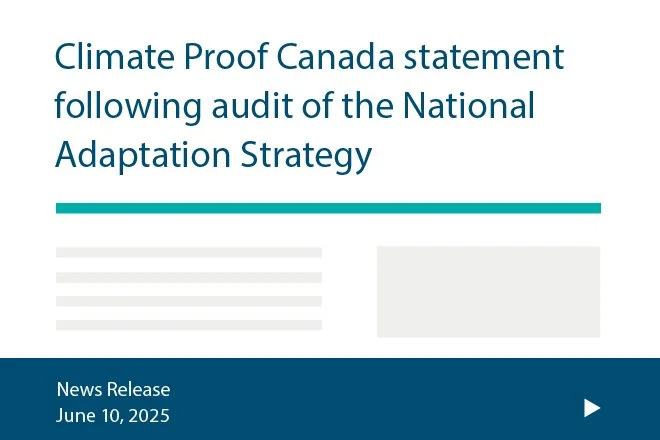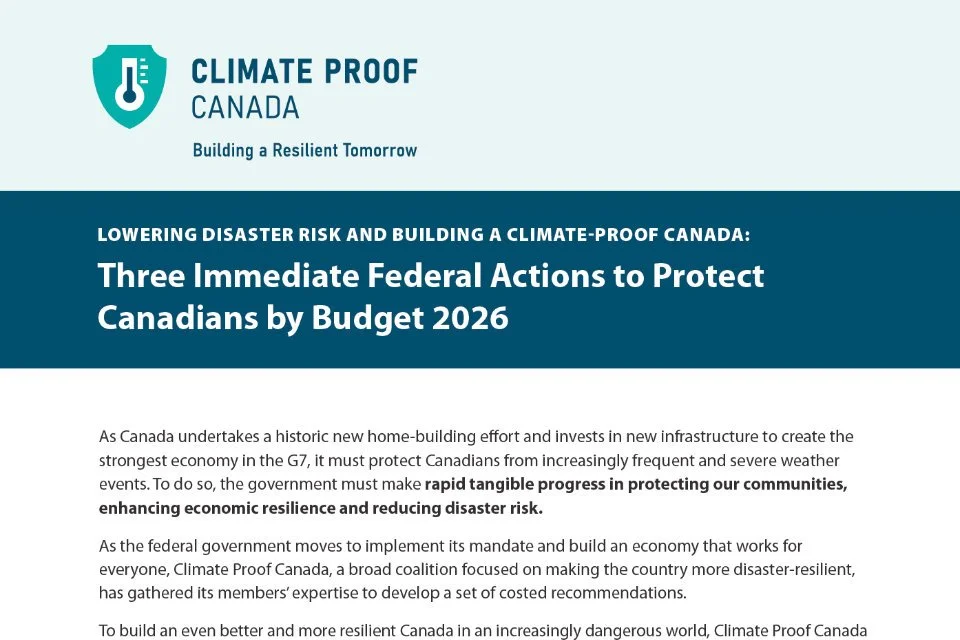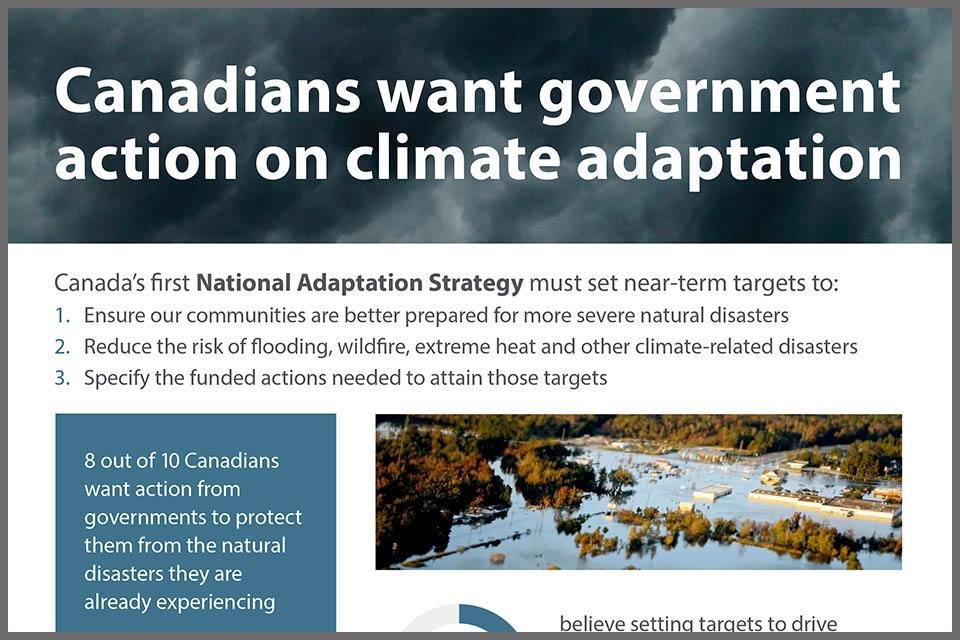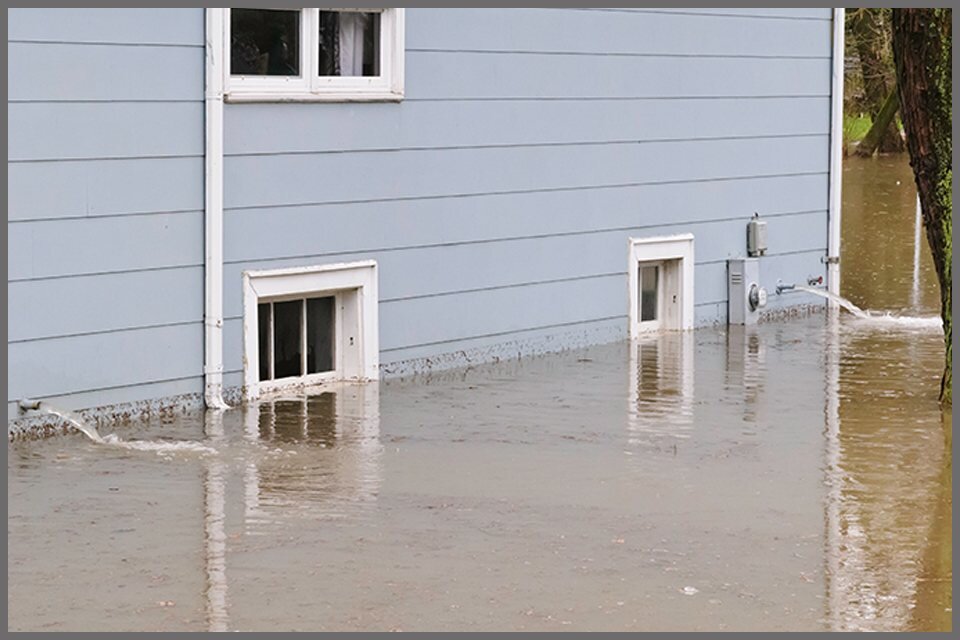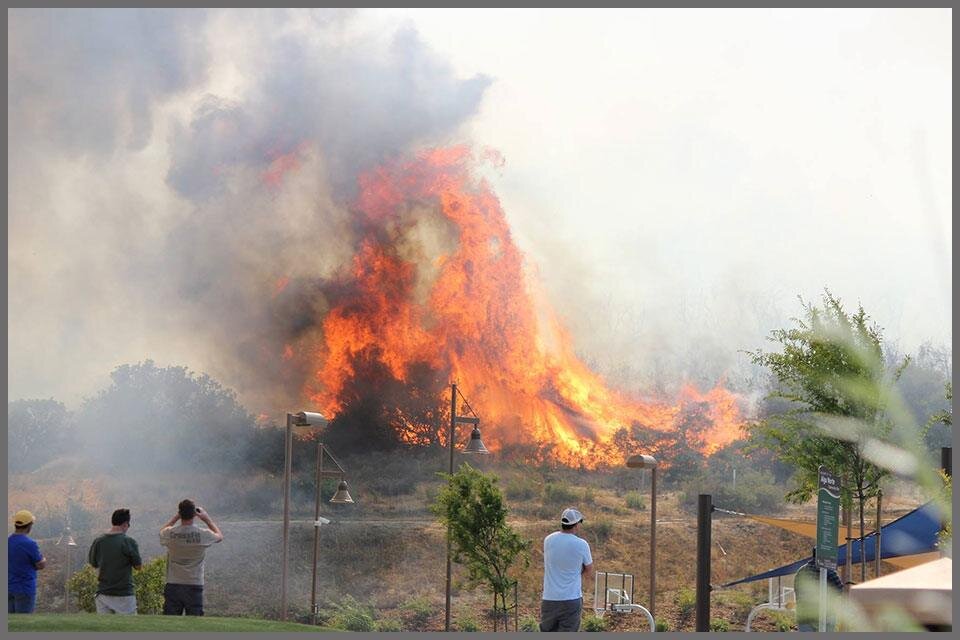
We need to act now to fully fund and implement Canada’s National Adaptation Strategy.
Parliament Hill through the wildfire smoke (7:15 a.m. on June 7, 2023). Photo Credit: Blair Gable Photography
Climate Proof Canada is a national coalition of Canadian business representatives, disaster relief organizations, municipalities, Indigenous organizations, environmental non-governmental organizations (NGOs) and think tanks that believe Canada must prepare for the present and growing effects of climate change through building a more disaster-resilient country.
Protecting Canadians
More and bigger floods, wildfires, hailstorms, and windstorms – influenced by our changing climate – are costing billions and putting people and property at risk.
To protect Canada and Canadians, the government must act by going on the offence to cut emissions but also playing strong defence by making our communities most resilient against disasters.
What’s new?
Request for Proposals (RFP): Secretariat Services for Climate Proof Canada
Climate Proof Canada (CPC), a coalition focused on advancing climate adaptation policy and advocacy, invites qualified organizations to submit proposals to provide Secretariat services.
The selected Secretariat will be responsible for day‑to‑day operations, coordinating activities, member engagement, and implementation of CPC’s advocacy and campaign activities. It will also ensure seamless coalition coordination, strong governance, clear communications, and dependable event delivery.
Proposals are due by February 28, 2026.
To receive the full RFP, or for more information about the role, please contact us at info@climateproof.ca.
Op-ed: Let’s Stop Building Homes in Harm’s Way
Canada is facing both a housing crisis and a climate crisis. We can’t solve one by ignoring the other.
The federal government’s launch of Build Canada Homes to help construct 3.9 million new homes by 2031 is ambitious and necessary. But here’s the hard truth: if we build these homes in the wrong places, we’re setting Canadians up for heartbreak.
Lowering Disaster Risk and Building a Climate-Proof Canada: Three Immediate Federal Actions to Protect Canadians by Budget 2026
As Canada undertakes a historic new home-building effort and invests in new infrastructure to create the strongest economy in the G7, it must protect Canadians from increasingly frequent and severe weather events. To do so, the government must make rapid tangible progress in protecting our communities, enhancing economic resilience and reducing disaster risk.
As the federal government moves to implement its mandate and build an economy that works for everyone, Climate Proof Canada has gathered its members’ expertise to develop three priority policy commitments and a set of costed recommendations the federal government should make.
Learn more here about the three immediate actions the federal government can take to protect Canadians.
2024 National Climate Adaptation Summit Day
In October 2024, Climate Proof Canada hosted its second National Adaptation Summit in Ottawa. Members and supporters of Climate Proof Canada met with cabinet ministers and members of the opposition parties to discuss Climate Proof Canada’s recommendations and urge immediate funding for the government’s National Adaptation Strategy. Climate Proof Canada’s ultimate goal is to help defend Canadians from the increasing risk of frequent and severe climate perils such as wildfires, floods and extreme heat.
In 2024, Climate Proof Canada revised its recommendations for resilience, focusing on the following four areas:
Building resilient infrastructure and communities
Enhancing Indigenous resilience
Enhancing disaster Resilience
Community health and well-being
National Adaptation Strategy
In June 2023, the federal government officially released the country’s first National Adaptation Strategy and the Government of Canada Adaptation Action Plan. Climate Proof Canada welcomes the announcement and celebrates the completion of this world-leading strategy document.
Climate Proof Canada actively supported the development of the National Adaptation Strategy, and advocated for the inclusion of targets to address the growing effects of climate change and build a more disaster-resilient country.
Learn more here.
Federal Budget
In March 2023, the Government of Canada released its 2023 Federal Budget. The budget demonstrated the federal government’s commitment to building on the National Adaptation Strategy with new investments to better protect and inform Canadians at highest risk of flooding and modernize the federal disaster assistance to better adapt to climate change. Learn more here.
Join us by sharing your support on X
Subscribe to receive updates from Climate Proof Canada
Are you a journalist working on a climate-related story? Climate Proof Canada experts are available to speak on a variety of topics. For more information and to set-up an interview, please contact media@climateproof.ca.
Videos
Climate Proof Canada’s National Adaptation Strategy Video at COP27
Setting National Adaptation Targets: National Adaptation Strategy Video
Resources
Building a Climate Proof Canada: National Resilience Recommendations to 2030
Climate Proof Canada presents a road map for the new federal government and 45th Parliament to make rapid tangible progress on protecting our communities, enhancing economic resilience and reducing disaster risk by climate-proofing Canada by 2030.
Lowering Disaster Risk and Building a Climate-Proof Canada: Three Immediate Federal Actions to Protect Canadians by Budget 2026
As the federal government moves to implement its mandate and build an economy that works for everyone, Climate Proof Canada has gathered its members’ expertise to develop three priority policy commitments and a set of costed recommendations the federal government should make.
2024 Federal Budget Submission
This submission outlines Climate Proof Canada’s recommendations for the National Adaptation Strategy Action Plan for the pre-budget consultations in advance of the federal budget.
National Climate Change Adaptation Summit Recommendations - Full Report
This report outlines recommendations from Climate Proof Canada on how the Federal Government can make rapid, tangible progress on implementing Canada’s National Adaptation Strategy.
National Climate Change Adaptation Summit Recommendations - Summary
This infographic includes a summary of the recommendations from Climate Proof Canada on how the Federal Government can make rapid, tangible progress on implementing Canada’s National Adaptation Strategy.
MANAGING FLOODING AND EROSION AT THE WATERSHED-SCALE: GUIDANCE TO SUPPORT GOVERNMENTS USING NATURE-BASED SOLUTIONS
This paper recommends 1) development of consistent provincial approaches to integrated watershed management, 2) direction of funding for river flood management to high-risk watersheds and 3) routine consideration of nature-based solutions for river flood and erosion management.
CANADIANS WANT GOVERNMENT ACTION ON CLIMATE ADAPTATION
Canadians support climate adaptation and want to see action from governments to protect them from the natural disasters they are already experiencing, according to a poll commissioned by Insurance Bureau of Canada (IBC).
ESSENTIAL ELEMENTS OF A NATIONAL ADAPTATION STRATEGY: CHECKLIST
This checklist was developed by Climate Proof Canada to help evaluate Canada’s first National Adaptation Strategy (NAS). It can be used to assess if the NAS lays out the necessary steps to reduce climate-related risk and protect people in Canada from harm in the face of climate change.
GETTING NATURE ON THE BALANCE SHEET
This report by the Intact Centre on Climate Adaptation at the University of Waterloo speaks to recognizing the financial value provided by natural assets in a changing climate.
ESSENTIAL ELEMENTS OF A NATIONAL ADAPTATION STRATEGY
Climate Proof Canada considers certain elements to be essential in any national adaptation strategy. This document outlines the recommended principles, objectives, goals and targets for Canada’s National Adaptation Strategy.
IISD REPORT
The International Institute for Sustainable Development and Insurance Bureau of Canada partnered on a report called Towards a National Adaptation Strategy for Canada: Key insights from global peers. This report outlines the key issues and considerations that should inform the development of Canada’s first national adaptation strategy.
FLOOD RISK IN CANADA
The Intact Centre on Climate Adaptation at the University of Waterloo and the Standards Council of Canada partnered on a report that outlines practical solutions and standards, from experts across Canada, that can be deployed to limit and/or mitigate flood risks. Read the Under One Umbrella: Practical Approaches for Reducing Flood Risk in Canada report.
THE HEALTH COSTS OF CLIMATE CHANGE
This report from the Canadian Institute for Climate Choices speaks to how Canadians can adapt, prepare and save lives.
THE COST OF CLIMATE ADAPTATION
The Federation of Canadian Municipalities and Insurance Bureau of Canada partnered on a report that demonstrates the urgent need for new investments in local climate adaptation – and the areas where that investment is needed most.
COST-EFFECTIVE HOME FLOOD PROTECTION
The Intact Centre on Climate Adaptation at the University of Waterloo created this infographic which outlines the three steps to cost-effective home flood protection.
THE COSTS OF CLIMATE CHANGE FOR CANADA
The Canadian Institute for Climate Choices provides an overview of the connections between impacts, adaptation and costs in its report called Tip of the Iceberg: Navigating the Known and Unknown Costs of Climate Change for Canada.
FLOODING IN CANADA
Insurance Bureau of Canada has extensive resources on flooding in Canada.
CANADIANS WANT GOVERNMENT ACTION ON SEVERE WEATHER
Buildings need to be part of Canada’s climate adaptation strategy
Retrofits play a role in not only decarbonizing buildings, but adapting them for increasingly extreme weather. In order to ensure the climate-resilience of Canada’s privately owned homes and buildings, they need to be explicitly included in the National Adaptation Strategy.
About Us
What is Climate Proof Canada?
We are a broad coalition of insurance industry representatives, municipal governments, Indigenous organizations, environmental NGOs and research organizations.
The coalition is encouraging the federal government to take action now to create a culture of preparedness and build a more disaster-resilient country.
Would your organization be interested in joining Climate Proof Canada? Let us know.
Climate Proof Canada Coalition Members:
INSURANCE INDUSTRY
Aon
Aviva
Canadian Association of Mutual Insurance Companies
Co-operators
Definity
Desjardins
Gore Mutual
Insurance Brokers’ Association of Canada
Insurance Bureau of Canada
Intact Financial Corporation
Property and Casualty Insurance Compensation Corporation
Sun Life Financial
TD Insurance
Travelers
Wawanesa
Zurich Canada
Northbridge Financial Corporation
MUNICIPALITIES
Federation of Canadian Municipalities
Great Lakes and St Lawrence Cities Initiative
INDIGENOUS ORGANIZATIONS
Métis National Council
Assembly of First Nations
DISASTER RELIEF ORGANIZATIONS
Canadian Red Cross
Civil Protection Youth Canada
PRIVATE SECTOR
Canadian Chamber of Commerce
Catavault/Stantec
Forest Products Association of Canada
Genesis Resiliency
Surrey Board of Trade
Seneca College
My Climate Plan
NATIONAL AND PROVINCIAL ORGANIZATIONS
Conservation Ontario
Ecology Action Centre
Engineers Canada
ENVIRONMENTAL NGOS AND RESEARCH ORGANIZATIONS
Canadian Association of Physicians for the Environment
Canadian Cattle Association
Institute for Catastrophic Loss Reduction
Intact Centre for Climate Adaptation
International Institute for Sustainable Development
NAIMA Canada
Passive House Canada
Smart Prosperity Institute
The Pembina Institute
MaRS Discovery District
Climate Risk Institute





